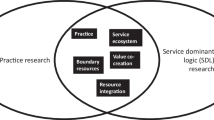Abstract
Services dominate the lives of consumers all over the world and constitute about 70 % of the world economy and are an integral part of consumers’ day-to-day experiences. However, transformative consumer research (Mick 2006) has provided limited research attention to the role of services in affecting consumer well-being. Transformative service research (hereafter TSR) is proposed as a “new area” in consumer and service research (Rosenbaum et al. 2011). TSR emphasizes the role of services and service systems in affecting the individual and collective well-being (Ostrom et al. 2015). TSR is the all-encompassing term for service research the central emphasis of which is to investigate the well-being implications of service for consumers and for the broader society.
Access provided by CONRICYT-eBooks. Download chapter PDF
Similar content being viewed by others
Services dominate the lives of consumers all over the world and constitute about 70 % of the world economy and are an integral part of consumers’ day-to-day experiences. However, transformative consumer research (Mick 2006) has provided limited research attention to the role of services in affecting consumer well-being. Transformative service research (hereafter TSR) is proposed as a “new area” in consumer and service research (Rosenbaum et al. 2011). TSR emphasizes the role of services and service systems in affecting the individual and collective well-being (Ostrom et al. 2015). TSR is the all-encompassing term for service research the central emphasis of which is to investigate the well-being implications of service for consumers and for the broader society.
Anderson et al. (2011: 3) is defined as “the integration of the integration of consumer and service research that centers on creating uplifting changes and improvements in the well-being of consumer entities: individuals (consumers and employees), communities and the ecosystem.” TSR is conceptualised as the research domain at the intersection of transformative consumer research and service research (Anderson et al. 2013). Although the prime focus of TSR research is on consumer well-being, quality of life, and health outcomes service researchers have also examined the more managerially relevant outcomes, such as customer satisfaction, loyalty, repurchase intentions, and intentions to spread word-of-mouth (Rosenbaum 2015). In their TSR framework Anderson et al. (2013) proposed four different dimensions such as service entities, consumer entities, the macro-environment, and well-being outcomes for conducting more research in this domain.
This section presents four very unique cases that encompass transformative service research.
The Prince Court Medical Centre (PCMC) case study examines healthcare service delivery with the ultimate aim of patient and family well-being. The service delivery also emphasizes the well-being of other important service entities like employees and community.
The Operation Megh Rahat case study is a very unique case which examines the service provided by Indian defence services in disaster management situations. Indian armed forces and especially the Indian army has a rich history in service to the nation whenever they have been called upon to do disaster management work. This case elucidates the transformative role of government services for the societal well-being.
The next case on ‘well-being through travel’ emphasizes the role of TSR in creating well-being in the travel and tourism services. The case underscores the numerous benefits of well-being through travel such as physical health, transcendence, self-esteem benefits, novelty and escape.
Finally the RIL case study delves into the social responsibility of private firm which has sustainability objectives. It emphasizes the role of firms to create stakeholder engagement via strategies which enable stakeholder well-being.
References
Anderson, L., Ostrom, A. L., & Bitner, M. J. (2011). Surrounded by services: A new lens for examining the influence of services as social structures on well-being. Working paper: W. P. Carey School of Business, Arizona State University.
Anderson, L., Ostrom, A., Corus, C., Fisk, R., Gallan, A., Giraldo, M., Mende, M., Mulder, M., Rayburn, S., Rosenbaum, M., Shirahada, K., & Williams, J. (2013). Transformative service research: An agenda for the future. Journal of Business Research, 66, 1203–1210.
Mick, D. G. (2006). Presidential address: Meaning and mattering through transformative consumer research. In C. Pechmann & L. Price (Eds.), Advances in consumer research (Vol. 33, pp. 1–4). Duluth, MN: Association for Consumer Research.
Ostrom, A., Parasuraman, A., Bowne, D., Patricio, L., & Voss, C. (2015). Service research priorities in a rapidly changing context. Journal of Service Research, 18(2), 127–159.
Rosenbaum, M. S., Corus, C., Ostrom, A. L., Anderson, L., Fisk, R. P., Gallan, A. S., & Williams, J. D. (2011). Conceptualisation and aspirations of transformative service research. Journal of Research for Consumers, 19, 1–6.
Rosenbaum, M. S. (2015). Transformative service research: Focus on well-being. The Service Industries Journal, 35(7–8), 363–367.
Author information
Authors and Affiliations
Corresponding author
Editor information
Editors and Affiliations
Rights and permissions
Copyright information
© 2017 Springer International Publishing Switzerland
About this chapter
Cite this chapter
Roy, S.K. (2017). Introduction to Transformative Services. In: Roy, S., Mutum, D., Nguyen, B. (eds) Services Marketing Cases in Emerging Markets. Springer, Cham. https://doi.org/10.1007/978-3-319-32970-3_13
Download citation
DOI: https://doi.org/10.1007/978-3-319-32970-3_13
Published:
Publisher Name: Springer, Cham
Print ISBN: 978-3-319-32968-0
Online ISBN: 978-3-319-32970-3
eBook Packages: Business and ManagementBusiness and Management (R0)




